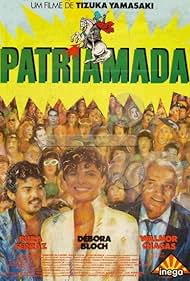During the demonstrations asking for the comeback of direct vote in Brazil, in 1984, a journalist interviews people involved with the political events and has an affair with a politician.During the demonstrations asking for the comeback of direct vote in Brazil, in 1984, a journalist interviews people involved with the political events and has an affair with a politician.During the demonstrations asking for the comeback of direct vote in Brazil, in 1984, a journalist interviews people involved with the political events and has an affair with a politician.
- Awards
- 4 wins & 1 nomination
Photos
Mario Andreazza
- Self
- (archive footage)
Aureliano Chaves
- Self
- (archive footage)
Paulo Maluf
- Self
- (archive footage)
- Director
- Writers
- All cast & crew
- Production, box office & more at IMDbPro
Storyline
Did you know
- TriviaThe film unites Lilian Lemmertz and Júlia Lemmertz, mother and daughter respectively.
- SoundtracksSolidão
Performed by Alceu Valença
Featured review
Strange as it may sound but I feel bad in giving a thumbs down to this film since I understood its values and I loved its concept, which was something I dreamt of doing and
writing and the makers of it made a lot better than what I had in mind since they had the advantage of being there when the events of Diretas Já were taking place, happening
right in front of them yet something was lost and the final result was slightly disappointing. I might rewatch this in a near future. But for the time being I keep with a down
opinion about it.
"Pátriamada" ("BelovedCountry" written altogether) tells the story of a conflicted love triangle during the final days of the military regime in Brazil when the nation was gathering for the return of democracy with the Congress voting on the issue of the direct vote for presidential elections in 1985. Key figures in the situation are a wealthy businessman (Walmor Chagas), a man who profited a great deal with the current political system but he's more inclined in changing the game and he declares support to the democracy, ideas brought on by an idealist reporter (Débora Bloch) of whom he has an affair; and there's the third wheel, her political activist boyfriend (Buza Ferraz), and both follow the political movement on the streets and interview politicians and artists who reflect the new ideals of the period.
That's the surprising and amazing part of the movie since the actual events of Diretas Já campaign are covered and the characters interact with the real figures, the real artists and the real politicians interviewing them, or following their rallies across the country, so you have a part fictional film mixed with a documentary that doesn't ring false in any aspect. It's the truth happening in front of you and you can get the zeitgeist of the period where people were excited about politics, they wanted to see change and you see everybody moving along, both favorable or opposed to a change in the game.
Political representatives on the side of Diretas like Brizola, Lula, Dante de Oliveira, Ulysses Guimarães all appear as themselves being interviewed by Débora's character, and there's even time to include then president Figueiredo as part of the opposition trying to calm people's animosity (and we know back then the cold, at times violent, distance the military put journalists on. The infamous video of general Newton Cruz attacking a reporter is a classic example). The line between fiction and reality is so thin that for a moment you start thinking the actors are actually real life characters truly involved in this scenario. And it's thanks to the openness of the regime at the time that a movie like this could be made, and had it been just a documentary it'd probably never seen the light of day since censorship was still a thing.
The ideas and its relevance for the period in presenting the importance of the direct vote's return and how the public perception was favorable to it, makes of this movie a true testament of its period, and it works a lot better than just seeing news clips that remember that era in countless documentaries presented. It isn't an overview seeing from the distance; this is ground level, from the period and with many insiders who were part of that history. For those moments this movie succeeds in being a brilliant piece of cinema and history. But as the fiction progresses with the confusing love story and the fights between the businessman and his family of numb wife and spoiled brat of a kid who works with the man, the movie drags on and on without a satisfying note, without an appeal so we could care for those characters. They are not challenging enough, they are all very one-dimensional.
Maybe it's a direction problem, I don't find Tizuka Yamazaki a strong name to carry a film like this, since she's best known for her box-office entertainment hits like the flicks she did with Xuxa (sure, she has other serious and well reviewed films such as "Gaijin" but most people associate her with Xuxa films).
It was a missed opportunity and with a more developed script it could turn into a 1980's classic. As said, I might return to it if I have the time and if feeling the need for it (I usually do that with films I don't like at first glance, some film reviewers do that immediately and then create a defined opinion). Since it's still fresh in my mind, it'll take some time. This downer review is just a way to form some thoughts and impressions about it, so I'm not suugesting you to avoid it neither being favorable enough to make you watch it, but something tells me that viewers who are curious about that historical period won't find much of an enlightning picture here neither will find it a nice "fiction" to follow. For those who lived those times, it'll be a fine nostalgic trip, slightly incomplete with something. But the passion, the positive feelings, the emotion from the crowd, is all there. If compared to what came in those 30 years later in terms of political engagement from the public, those were lovely and respectful times; the division that came after that became sickening, violent and the word democracy became a shameful term to be used. It became a fight to the death where collective ideals are seen as negative and personal interests dominate the discussion of power. We still struggle. 5/10.
"Pátriamada" ("BelovedCountry" written altogether) tells the story of a conflicted love triangle during the final days of the military regime in Brazil when the nation was gathering for the return of democracy with the Congress voting on the issue of the direct vote for presidential elections in 1985. Key figures in the situation are a wealthy businessman (Walmor Chagas), a man who profited a great deal with the current political system but he's more inclined in changing the game and he declares support to the democracy, ideas brought on by an idealist reporter (Débora Bloch) of whom he has an affair; and there's the third wheel, her political activist boyfriend (Buza Ferraz), and both follow the political movement on the streets and interview politicians and artists who reflect the new ideals of the period.
That's the surprising and amazing part of the movie since the actual events of Diretas Já campaign are covered and the characters interact with the real figures, the real artists and the real politicians interviewing them, or following their rallies across the country, so you have a part fictional film mixed with a documentary that doesn't ring false in any aspect. It's the truth happening in front of you and you can get the zeitgeist of the period where people were excited about politics, they wanted to see change and you see everybody moving along, both favorable or opposed to a change in the game.
Political representatives on the side of Diretas like Brizola, Lula, Dante de Oliveira, Ulysses Guimarães all appear as themselves being interviewed by Débora's character, and there's even time to include then president Figueiredo as part of the opposition trying to calm people's animosity (and we know back then the cold, at times violent, distance the military put journalists on. The infamous video of general Newton Cruz attacking a reporter is a classic example). The line between fiction and reality is so thin that for a moment you start thinking the actors are actually real life characters truly involved in this scenario. And it's thanks to the openness of the regime at the time that a movie like this could be made, and had it been just a documentary it'd probably never seen the light of day since censorship was still a thing.
The ideas and its relevance for the period in presenting the importance of the direct vote's return and how the public perception was favorable to it, makes of this movie a true testament of its period, and it works a lot better than just seeing news clips that remember that era in countless documentaries presented. It isn't an overview seeing from the distance; this is ground level, from the period and with many insiders who were part of that history. For those moments this movie succeeds in being a brilliant piece of cinema and history. But as the fiction progresses with the confusing love story and the fights between the businessman and his family of numb wife and spoiled brat of a kid who works with the man, the movie drags on and on without a satisfying note, without an appeal so we could care for those characters. They are not challenging enough, they are all very one-dimensional.
Maybe it's a direction problem, I don't find Tizuka Yamazaki a strong name to carry a film like this, since she's best known for her box-office entertainment hits like the flicks she did with Xuxa (sure, she has other serious and well reviewed films such as "Gaijin" but most people associate her with Xuxa films).
It was a missed opportunity and with a more developed script it could turn into a 1980's classic. As said, I might return to it if I have the time and if feeling the need for it (I usually do that with films I don't like at first glance, some film reviewers do that immediately and then create a defined opinion). Since it's still fresh in my mind, it'll take some time. This downer review is just a way to form some thoughts and impressions about it, so I'm not suugesting you to avoid it neither being favorable enough to make you watch it, but something tells me that viewers who are curious about that historical period won't find much of an enlightning picture here neither will find it a nice "fiction" to follow. For those who lived those times, it'll be a fine nostalgic trip, slightly incomplete with something. But the passion, the positive feelings, the emotion from the crowd, is all there. If compared to what came in those 30 years later in terms of political engagement from the public, those were lovely and respectful times; the division that came after that became sickening, violent and the word democracy became a shameful term to be used. It became a fight to the death where collective ideals are seen as negative and personal interests dominate the discussion of power. We still struggle. 5/10.
- Rodrigo_Amaro
- Oct 21, 2022
- Permalink
Details
- Release date
- Country of origin
- Language
- Also known as
- Beloved Country Brazil
- Production companies
- See more company credits at IMDbPro
- Runtime1 hour 43 minutes
- Color
Contribute to this page
Suggest an edit or add missing content








